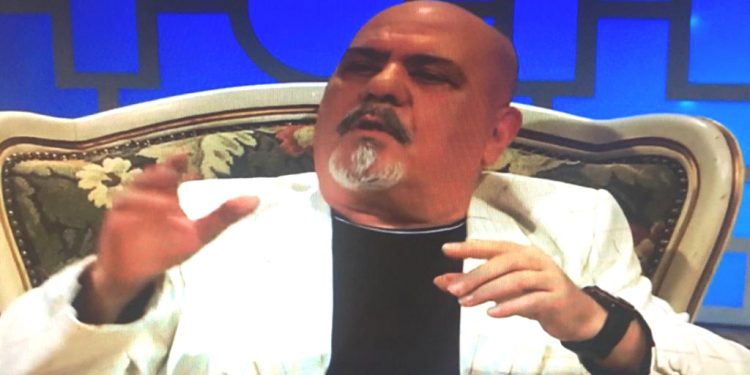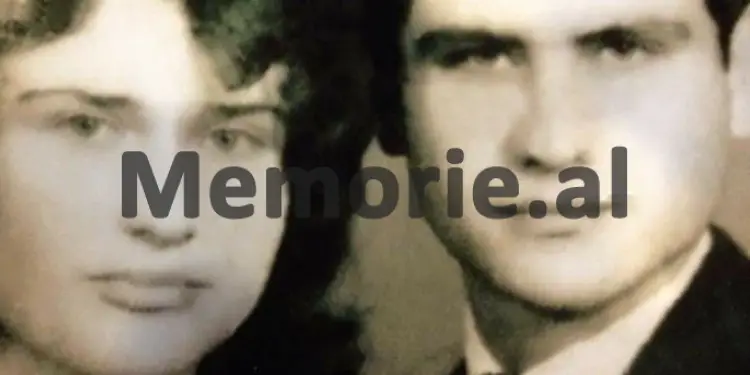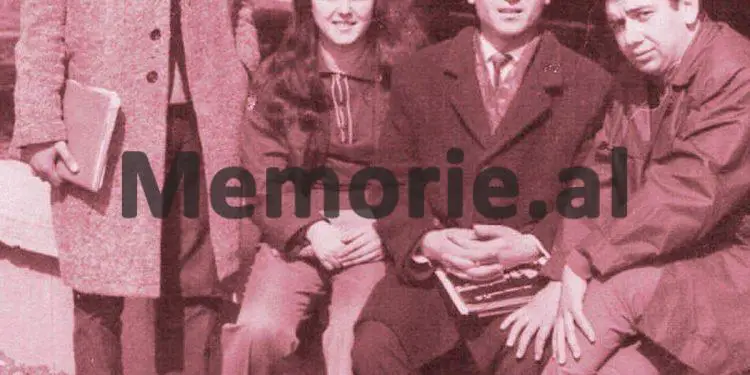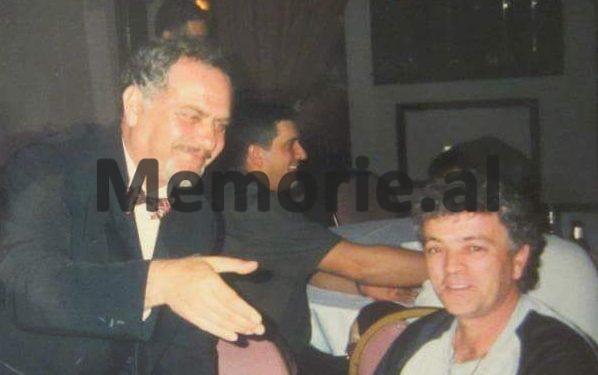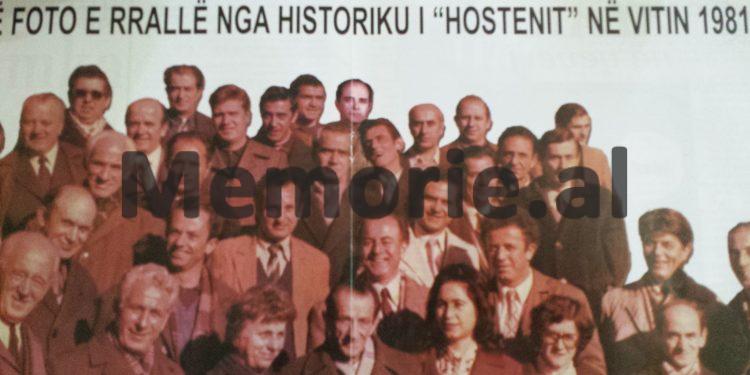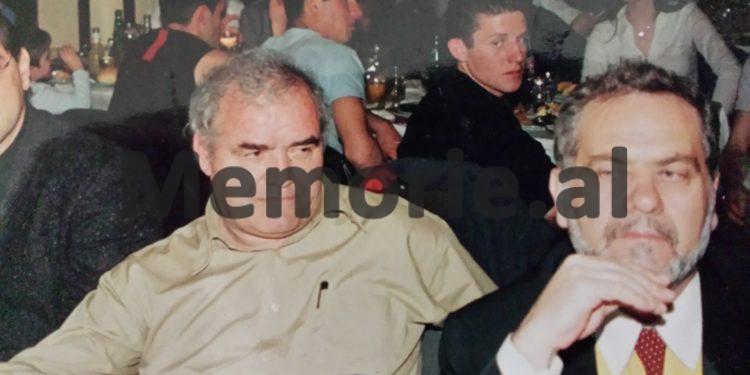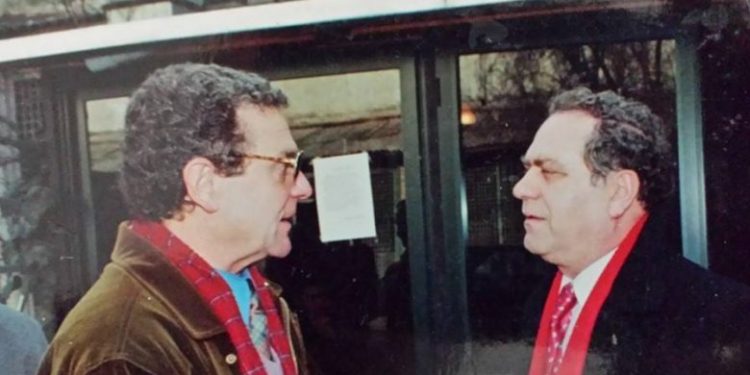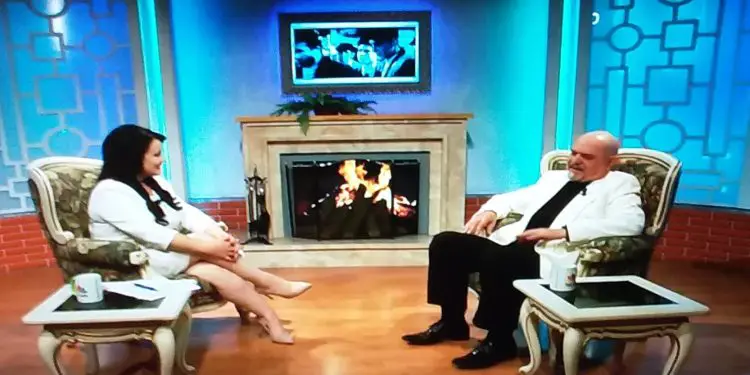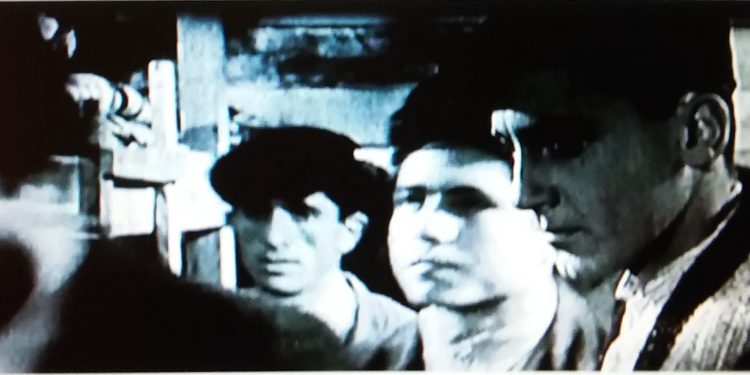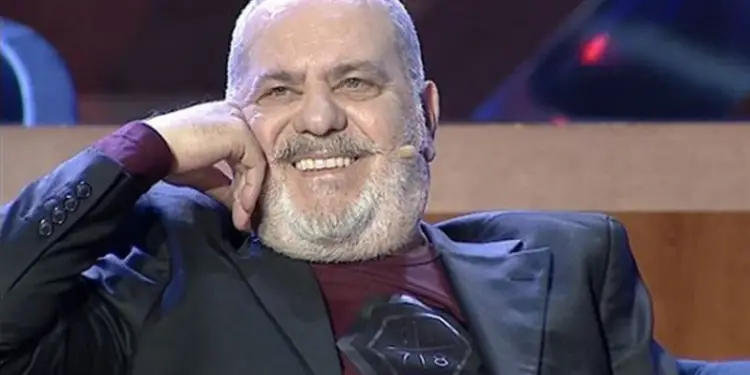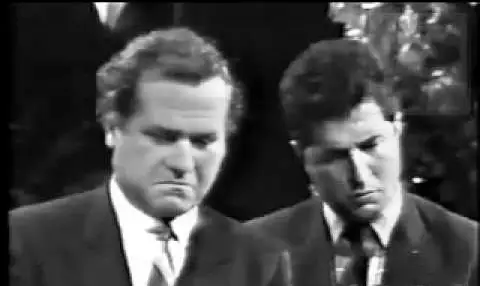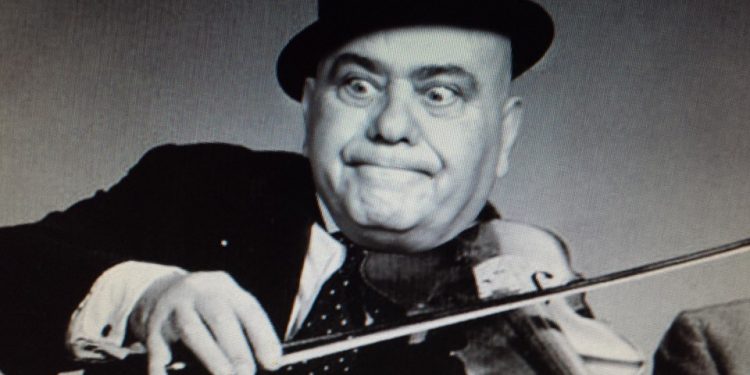Dashnor Kaloçi
Second part
Memorie.al publishes an interview given in the show “RRËFIM” on TV Scan some time ago, by the great Albanian painter, cartoonist, screenwriter, actor and director, Koço Devole, who passed away a few days ago, i who for 90 minutes, has told some of the unknown events and stories of his life, family and artistic career, starting from the origin of the family, the specialization of his father, Thanas, in Italy for cinematographer, work in that profession in the town of Kuçova, where Koço was born, coming to Tirana as a cinematographer at the “17 Nëntori” Cinema, leaving and being sent to Kombinat with a sentence as a worker, after it was discovered that he had arranged a direct telephone line for Tuk Jakova and Bedri Spahiu, who were declared “enemies of the people”, Koço’s participation in the film rehearsals for a role in the film “Debate”, where he “did not win”, and an extra in “The First Years”, etc.
Koço’s passion and tendencies for painting, where he studied with the Russian engineer at the “Stalin” Textile Factory in Tirana, as well as with the theater district at the Pioneers’ Palace, where the Russian director entrusted him with several roles, the first cartoon he published in ‘Hosteni’ in 1964, roles in some dramas in the Culture Club in Kombinat, competition for the Art High School and biographical obstacles for ‘runaway uncle’, the right to study in Mechanical Engineering in Tirana where he stayed only two years, ‘for the sake of’ of the Indonesian friend who made the portrait and was ‘rewarded’ with coffee, lunches and dinners at the ‘Volga’, going to the Soldier and engaging in the Soldier’s Variety with his childhood friend, Roland Trebicka, after the intervention of the director, Viktor Gjoka, giving performances until at the farthest border points, etc.
The release of Koço from the Army and the work in the Culture Club in Kombinat, where he made a big name, after painting Enver Hoxha on a giant facade, the engagement in the magazine ‘Hosteni’ as a cartoonist and with scenarios for sketches and parodies, the appointment in the State Variety and then in the Albanian Radio-Television, work and projects after the ’90s with films, comedies, spectacles, etc., cooperation and work with a close friend of life, Filip Çakuli, until his prophecy said in this the show, where he said, among other things: “… They do not ask at all if a great artist passed away, it is unfortunate! They refuse to escort them to the last apartment from the Theater, e.g. There have been many cases. The last case was Hajrie Rondo who with a hundred prayers, helped her a little. When they die yes, ironically, to do the greatest honor. I know that when I die, they will honor me, and they will say the usual things they said to others … “
“Before the ’90s, artists were praised, that the Party, did propaganda and called us’ its helpers’. That’s why he paid us. But this has nothing to do with the dictatorial system. We were respected by the party secretaries and everyone else. But that does not mean that system has been good. Absolutely, it has been dictatorial.
This is what the painter, cartoonist, screenwriter, actor and great director of Albanian humor once said in a long interview for the show “RR përFIM” on TV Scan, (authored by Dashnor Kaloçi and moderated by Albana Shehu Qirjako). , Koço Devole, who passed away on November 8 and unfortunately, his prophecy “was fulfilled point by point”, as if the great Devole, “had left him with a trust”, after he was escorted to the last apartment from a private funeral home ?!
In homage to one of the greatest icons of Albanian humor, Memorie.al, has uncovered and brings exclusively to readers, the rare testimonies of the ‘Grand Master’, Koço Devole, in several issues.
Continued from the previous issue
Mr. Devole, so there you gave the first show, premiere how to say…?
Yes, yes, in the snow where everything was frozen and what performances, the orchestra had frozen its hands, but they continued according to the scores, and some five thousand soldiers and officers and reservists who were there, even more were, that it was the slogan ” “All the people are soldiers”, so the whiteness of the snow and ice no longer seemed there, but only everything green. Everyone listened attentively and applauded even though it was freezing, so to speak, the stage had frozen all over and at one point, when the orchestra no longer worked its fingers to drop the instruments, that their hands were frozen, director Viktor Gjoka, asked the Chief of General Staff Petrit Dume, to bring something to warm his hands, that the show could not continue. An order was given as to where they found a brazier and brought it to where the orchestra members were warming up, pushing each other as close as possible to the brazier and dropping the instruments so half-frozen, but the show continued and closed with success, albeit in those extremely difficult atmospheric conditions.
But how did the show go on in that cold, when everything was frozen?
He also went on, those of the orchestra, that of the clarinet, the trumpet, the oboe, the accordion, etc., went to the brazier, because only there could they fall to the instruments so bent, that they could not stand up, as they had almost frozen. those desolate. And when the show ended, the Chief of Staff, Petrit Dume, addressed us, the entire staff of the Soldier Variety, telling us:
– “You see what these soldiers are removing, freezing in this cold to follow your performance, so you have to train like these, in frost like this, to defend the homeland, when the need arises”!
Did any of you speak?
What would we say, who dared, you are on your own, no one dared to tell even the director at least, that there are some conditions for the show and one cannot sing in the fridge, or the orchestra can play the instruments , when did their hands freeze… ?!
Anyway, you got there…?
Yes, yes, we definitely got used to it (laughs), pity to cry, because we were soldiers and we would go where the homeland needed, like there in Vërzhezhë giving performances!
Are we in that moment of your life when you went soldier and gave performances?
Yes, we were continuing to give performances and we gave in the whole territory of the Republic, so I am defining it correctly, that we gave performances even in the most remote border points, where the border post had six soldiers, with all the chef , giving a full show, as if we were on the stage of the Tirana Variety. And, out of those six soldiers, three followed us applauding, that the other three were asleep, that they had been on duty. Until Karaburun of Vlora, we were to give performances and when we went there, there was no road at all. We went by mule to the place of the show, loading the clothes and musical instruments where the car left us, the “Zisa” of the army were those cars, but they could not walk anymore. And we walked for an hour and a half, behind the mules, and when we got there, we found 11 soldiers in total, together with the officer and the captain of the military point, while we were a total of 45 people, together with the director. There was nothing there, it was just a half-collapsed silo and we started the show, where the ten of them (that one was on the spot) sat on the ground, where someone picked up a brick, the other a stone, tile, or other tools circumstantial, what would the deserts find, to sit, that he could not be beaten for two hours on the ground, that man is cold. After they sat down, we quickly improvised the scene with blankets, umbrella sheets, etc., turned on the microphones and started the show, but those desolate soldiers moved, lest we be beaten for two hours on the stone while we did not move at all. What can I say, it was the order of the Chief of General Staff, Petrit Dume, that Estrada Soldier, I will go even to the farthest point? And we went, to Orosh, to give performances, where and there were 10 soldiers and some 5 or 6 geologists, we gave performances for them. Those deserters, soldiers and geologists, told us:
– “Well, what did they want from you here …”?!
“Hey, what do we want, we are…”, we said. After all these movements that we have given performances, that we have been all over Albania, we have endless, endless history, that I forgot the strongest, the performance that we have given before the Chief of General Staff in Çorovoda.
But why in Çorovodë for the Chief of Staff…?!
He shot that he came there for some kind of inspection or control, where tunnels were opened (Guak, or Kakrruk, I think it was called that place) and when he saw us, he said to our great Director, of the Central House of the Army:
– “Ore, I saw this premiere …”?
– “I do not know, Comrade Chief of Staff …”, he said to him, all fear was gone, because he felt that he was in trouble.
“Well,” he said, “we are with these generals here at the bar and get ready to come and give a show, to see what you have done”?
We had the show for the public of Skrapar at six o’clock in the evening, but after that, we, the men, got ready, because it was 12 o’clock where we would give the show at the restaurant where they were accommodated, the Chief of General Staff with the two generals, the names I do not remember, but all three were healthy and one was the Commander of the Military Corps of Southern Albania. They set up a big table there at the restaurant, with a wild boar in front, not exactly, but half a wild boar, with knives, forks, wine glasses in front, etc., while we set the counters and after the window panes were covered large with white sheets, so that nothing could be seen from the outside, we started the show.
It was a big responsibility for you …?!
Definitely a great responsibility, as he was the Chief of General Staff, the biggest for us, that the Minister of Defense, Beqir Balluku, did not come at all and we had never seen him closely! So, this was the biggest for us, Petrit Dume, we knew that about everything. This is how the show started and our great Director, of the Central House, from behind the scenes, had his eye on a hole and was going to pay attention, did they like the show?!
Did they pay close attention to your show?
Ehh, to be honest, they ate more and sometimes turned their heads away from us, who sang:
“The People’s Army is us / ready for defense / in any war with enemies and traitors / etc”, and we raised our voices loudly, when it shot that they raised their heads from the plates and looked at us. They ate, drank and did not mind at all, we looked behind the scenes and did not understand what was happening there. Meanwhile, one of those two generals, that of the Southern Corps, as far as I remember, caught a strong joke, which he liked from a sketch, and started laughing: “Haaahaaa …, oh how beautifully he said it, …. very beautifully said ….”!
Meanwhile, he saw Petrit Dume and addressing that actor, he said: “What did you say, what did you say …”?!
He was desolate, Ferit Vogli, he was, he lowered his head and did not speak at all, because he was afraid that he had not made any mistake or who knows, but out of fear he answered:
– “What did I say, nothing …, I said: ‘o Muço, o Muço, where should the mule take the wood ….”.
Petrit Dume replied angrily: “What is there to laugh about …”, and turned to this general, saying:
– “What is there to laugh about …”?! “No, no, there is nothing to laugh about here, but if he connects the joke well, it turns out better ….”, he continued the general! “Well, connect, connect, the general’s very good,” he told Petrit Dume.
Did he change the joke of the sketch?
Yes definitely, after these words we started the sketch from the beginning, but to be honest we were very tense and we were watching those who were watching us?! At one point, a joke came that Ferit Vogli said from the beginning: “O Muço, o Muço, where should the mule take the wood …”, and all of us instinctively turned our heads from Petrit Dume, seeing how he would react. He raised his head, which until that moment had been sitting on the plates, and once looked sideways at the general, at us, and said:
– “Even when connected, it does not work, remove it at all, remove it at all, leave this, it does not work, what else do you have?! So, we gave the whole show to the end, interrupting it, repeating it, etc., and so the whole show went under unprecedented pressure, where we all shivered with fear. In these conditions we made humor. And most beautifully, when these hostile groups started coming out, who were convicted as coup plotters, they removed us too!
What did you have to do with …?!
What kind of connection did we have, I know we did not have, but those who took us away or did they know, here is the problem, but they took us back and took me away again!
But why were you fired?
They removed me because they had said about me: “Who is it, the director who wears that collar with a thick head …”, because later they made me a director and I kept the collar tied thickly, that it was fashionable like that. I was removed from the collar job and sent back to Kombinat.
So, you as a father, with a sentence to be educated in Kombinat?
Yes, yes, as a father, the same, but I would be re-educated in the working class, so I went there for re-education. As soon as I went there, a Chief of Staff, who knew my father, met me and said:
– “Well, mo, but why do you come here, why do not you go to the Culture Club, because you are an artist…”?!
– “Yesss I am; I said, ‘but they sent me here’?!
“Yes, they sent you, they did very well, but go there from the Culture Club and make us a theater,” he told me.
“For six months, they sent me,” I told him.
“Very well, six months of work,” he told me, and I went to the Culture Club, dealing with theater, preparing these amateur theaters for those working-class enterprise competitions that took place every year. But, since I was convicted and since I came from a Professional Variety, I had ambitions in that job, to win awards in the competitions that took place, because then the Textile Factory, won first places in these competitions, they were praised by those managers and secretaries of parties, we have Koçon, etc., because their name came out for good and they wanted to keep me there.
Were you held?
They kept me until I became a director of the Trade Unions, because we directors were paid then by these Cultural Clubs of Trade Unions and the main thing, and the biggest responsibility I had there, were these May Decades. They were given great importance, they came from the District Party Committee and were interested in everything in detail: I took the dances, the music, the lyrics, everything, everything. And you had to answer for everything that was required, where even though I was of the theater or variety profile, I also had to answer for the lyrics, etc. Many well-known directors and actors have come to Kombinat, to the Culture Club, such as the well-known director, Pandi Stillu, whom my generation remembers, etc., Viktor Gjoka, the famous actor and director of Albanian humor, has put on many plays and other directors have come there. And among all these, I would definitely single out the famous director and actor, Kujtim Spahivogli, one of the most famous lecturers of our Institute of Arts. A great man who has left an impression everywhere and with whom he has worked, but he had the luck he had, that I would not wish on anyone. The memory came at the time I was there at Kombinat and wanted to put on a show. One day, the director comes and tells me:
– “Hey, this Memory is good from the hustle and bustle (putting your finger on your head), do you know anything …”?!
– “Yes, it is very good, why is it like this”, I replied, ‘we have the best director in Albania’ and I started to count him: he did not put Hamlet, he did not put this, not that …. “?!
– “Well, well, you took Hamlet, well, but did you find out what he will do …”, the director addressed me.
“No, I do not know anything,” I said!
– “I do not know how, I will put on stage, the drama ‘Whores of the Combine’, he told me scared, ‘but we will talk when Kujtim comes, we will call you too, and we will not allow him make such a mess of us “, said the director and met with Kujtim, but I was not called. When he came, the director introduced us, saying to me, ‘here we have a director’ and Kujtim shook my hand, and with that warm voice like he was, (ehhh how was Kujtim, anyone you ask about the memories of Kujtim , only good words will say about him), and asked me:
– “More, have you read this”?
“No,” I said.
– “Okay, read on” and gave me those sheets of drama he had written, entitled “Whores of the Combine”! I read it and it was a fantastic comedy (because others have put it), but it was great, where it had the core from Aristophanes’ “Lysistrata” in ancient Greece, and its extra, it was the one with women that towards them in Kombinat, they behaved very badly and there were many problems, but in that comedy, the roles change. So that was, so to speak, the essence, its core. And the women said unto the men, go ye into our country, that we may do unto you, as ye do unto us, and hear what we shall say unto you, as ye speak unto us, and we shall see, and ye shall endure. you, or you will not endure as we have endured and we endure. This was like saying the extract of the part, but he did not put it on “Lisistrata”, which is that terrible sex strike, because this is Aristophanes’ “Lisistrata”, where the women of that time, said to rest all the wars, all the battles, conflicts, etc., that otherwise we will start the sex strike, and there is no more and they will be forced to come because they will miss it. /Memorie.al
Continues tomorrow




